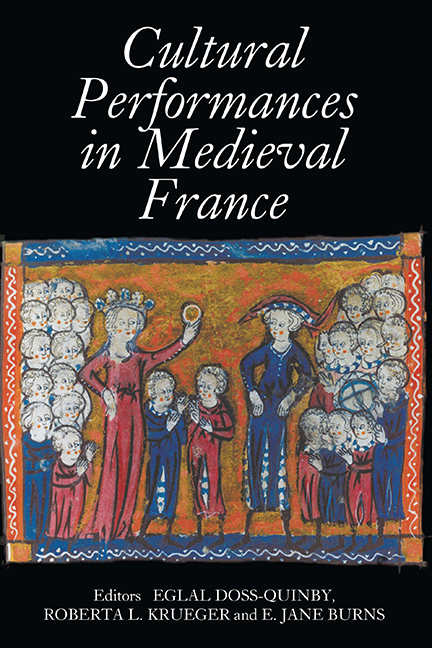Book contents
- Frontmatter
- Contents
- List of Illustrations
- Contributors
- Introduction
- Nancy Freeman Regalado, Curriculum Vitae
- PART I POETIC AND MUSICAL PERFORMANCES
- PART II PERFORMING SEXUAL AND SOCIAL IDENTITIES
- PART III DEVOTIONAL PRACTICE AND TEXTUAL PERFORMANCE
- PART IV PERSUASIVE PERFORMANCES
- PART V RE–ENACTMENTS AND LEGACIES
- Variegated Performance of Aucassin et Nicolette
- Late Medieval Representations of Storytelling and Story-Performance
- Paratextual Performances in the Early Parisian Book Trade: Antoine Vérard's Edition of Boccaccio's Nobles et cleres dames (1493)
- “Resuscitating” Medieval Literature in New York and Paris: La femme que Nostre-Dame garda d'estre arse at Yvette Guilbert's School of Theatre, 1919–24
- The Pitfalls and Promise of Classroom Performance
- ” Dunc chante haut et cler » : remarques sur l'interprétation de la musique médiévale
- Tabula Gratulatoria
- Tabula Gratulatoria
The Pitfalls and Promise of Classroom Performance
from PART V - RE–ENACTMENTS AND LEGACIES
Published online by Cambridge University Press: 24 October 2017
- Frontmatter
- Contents
- List of Illustrations
- Contributors
- Introduction
- Nancy Freeman Regalado, Curriculum Vitae
- PART I POETIC AND MUSICAL PERFORMANCES
- PART II PERFORMING SEXUAL AND SOCIAL IDENTITIES
- PART III DEVOTIONAL PRACTICE AND TEXTUAL PERFORMANCE
- PART IV PERSUASIVE PERFORMANCES
- PART V RE–ENACTMENTS AND LEGACIES
- Variegated Performance of Aucassin et Nicolette
- Late Medieval Representations of Storytelling and Story-Performance
- Paratextual Performances in the Early Parisian Book Trade: Antoine Vérard's Edition of Boccaccio's Nobles et cleres dames (1493)
- “Resuscitating” Medieval Literature in New York and Paris: La femme que Nostre-Dame garda d'estre arse at Yvette Guilbert's School of Theatre, 1919–24
- The Pitfalls and Promise of Classroom Performance
- ” Dunc chante haut et cler » : remarques sur l'interprétation de la musique médiévale
- Tabula Gratulatoria
- Tabula Gratulatoria
Summary
A desire to bring together medieval French literature and performance has twice led me to teach a course focused on the city of Arras through its geography, history, and literary expression. The course's interdisciplinary structure and multiple aims are briefly outlined in the description:
During the medieval period, Arras was a major commercial and cultural center in northern France. This course explores the complex world of Arras by highlighting two of its major authors, Adam de la Halle and Jean Bodel, whose works run the gamut of literary forms practiced from the late twelfth through the thirteenth century: from epic to bawdy tale, from debate poems to sacred and comic theater, from poems of leave-taking to pastourelles and love songs. Focusing on the urban context of Arras, we will concentrate particularly on lyric poetry and theater, two genres especially linked to the dynamics of performance. Students will have the opportunity to gain insight into the imaginative world of these texts by researching their context and performing them in the theater of the class.
In the course design, performance as a facet of medieval works intersects with performances realized by students, who are invited to encounter these very foreign texts through distinct but complementary approaches, each yielding its own kind of insights and identifications. An intellectual approach “from the outside” situates the medieval texts in their historical and political, social and cultural contexts. A more intuitive approach works “from the inside”: students organized in teams invent ways to present selected scenes, excerpts, or poems, and then perform them for the pleasure of the class, whose collective role as Arrageois audience completes the exchange and launches further analysis and discussion. In this essay in honor of Nancy Freeman Regalado, teacher and mentor par excellence, I would like to share my experiment, its promise and problems, and offer colleagues a pedagogical model that capitalizes on the multiple talents of our students, while demonstrating that medieval works can still leap off the page and live in performance.
Since the course was conducted in French and included both undergraduates and graduate students who had no previous experience with medieval literature, I used texts in bilingual editions or found both versions in separate editions to put on reserve or include in a course packet.
- Type
- Chapter
- Information
- Cultural Performances in Medieval FranceEssays in Honor of Nancy Freeman Regalado, pp. 279 - 288Publisher: Boydell & BrewerPrint publication year: 2007



